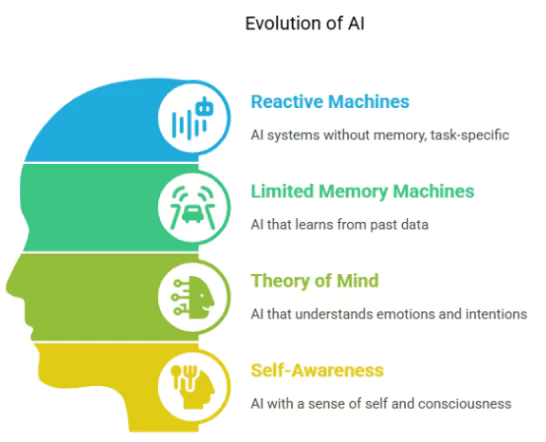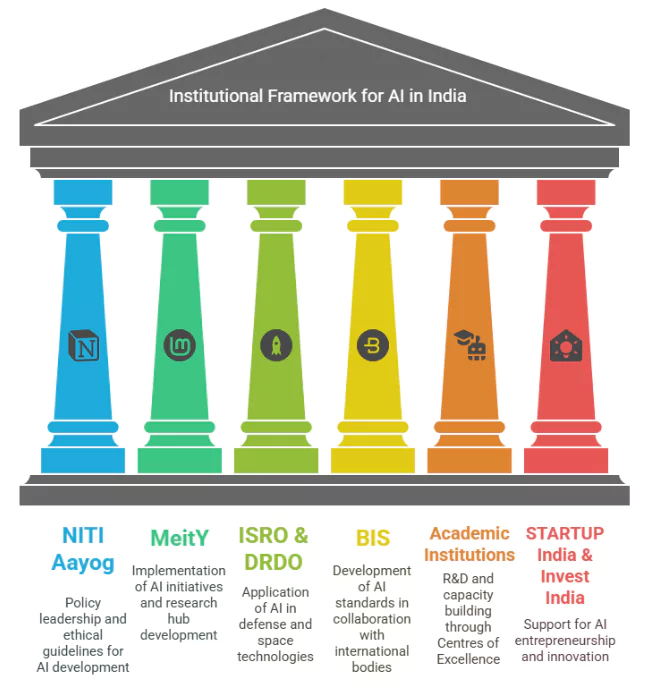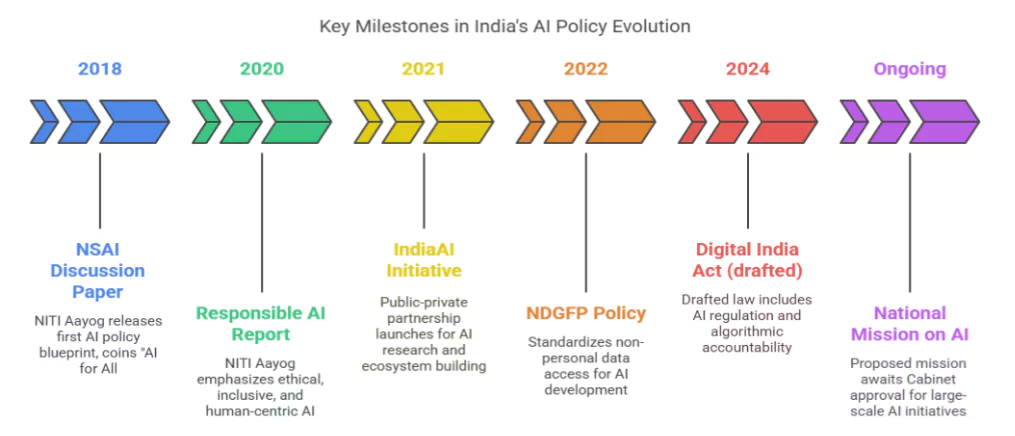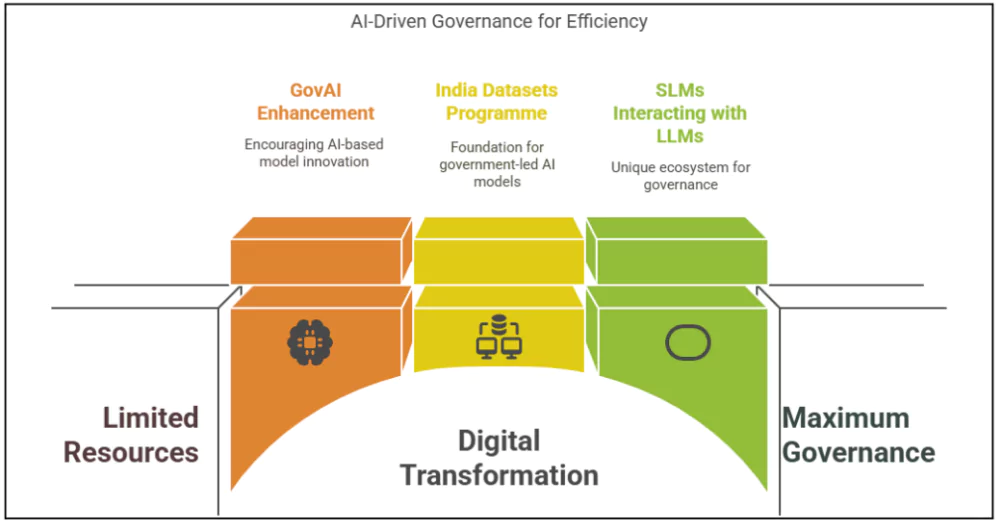India hosted a workshop on “AI for Good Governance” , reaffirming its commitment to data-driven, efficient, and citizen-centric digital public infrastructure using AI.
Key Highlights of the “AI for Good Governance” Workshop
- Organized by: The workshop was conducted by the Department of Digital Technologies and Governance (DDT&G), Government of Himachal Pradesh, in collaboration with the National e-Governance Division (NeGD) under the Ministry of Electronics and Information Technology (MeitY).
- Purpose: The event aimed to sensitize over 100 senior officials on the role of AI in governance, focusing on transparency, efficiency, and citizen-centric service delivery.
- The workshop is part of NeGD’s Capacity Building (CB) initiative under the broader IndiaAI Mission, supporting states in building AI-ready governance frameworks.
- Technical Focus Areas: Key sessions covered AI foundations, risk mitigation, adoption strategies, tools for public administration, and cyber hygiene.
- Strategic Vision: State officials emphasized ethical, inclusive, and innovation-driven AI deployment, reaffirming commitment to digital transformation and resilient AI infrastructure.
About Artificial Intelligence

- Artificial Intelligence (AI) refers to machine-based systems capable of performing tasks that typically require human intelligence such as decision-making, pattern recognition, learning, and problem-solving.
- Role in Governance: AI in governance ( GovAI ) refers to the deployment of intelligent technologies in public administration to enhance efficiency, responsiveness, transparency, and service delivery
- Role in Economy: AI can be instrumental in changing the economic landscape, particularly in areas such as personalised marketing, enhanced customer experience, and market intelligence.
- According to PwC’s 27th Annual Global CEO Survey 2024, 70% of Indian CEOs believe that Generative Artificial Intelligence (GenAI) will transform value creation within the next three years.
Trends that are Driving AI in India
- Digital Connectivity Expansion: India has 90 crore internet users in 2024; projected to reach 120 crore by 2026, making it the most connected digital society globally.
- Growing AI Startup Ecosystem: Over 1,00,000 startups, including many AI-driven firms, have emerged, fuelled by India’s DPI-led digital initiatives.
- Massive Public Investment in AI: The government allocated INR 10,354 crore to the IndiaAI Mission, focusing on data, innovation, and indigenous capability.
- Rich Public Data Ecosystem: India’s digital public infrastructure has created one of the largest public data repositories, vital for training AI models.
- GovAI as a Governance Multiplier: AI is transforming governance through apps and small language models (SLMs), improving policy design, public service delivery, and disaster management.
Advantages of Using AI in Governance
- Data-Driven Decision Making: AI enables evidence-based policy formulation by analysing large datasets.
- Example: Aadhaar-enabled Direct Benefit Transfers use AI to reduce subsidy leakages.
- Efficient Public Service Delivery: Automation reduces human error, speeds up processes, and enhances transparency.
- Example: Passport Seva Kendras automate scheduling and documentation processes.
- Personalized Services: AI chatbots and interfaces offer customized services in regional languages.
- Example: MyGov Portal uses AI to personalise citizen engagement.
- Predictive Governance: Anticipates disasters, diseases, or economic crises using machine learning. For Example, Indian Meteorological Department uses AI to predict cyclones and issue early warnings.
- Smart Infrastructure Management: Urban services are optimised through AI, enhancing quality of life. Smart Cities Mission uses AI for traffic, waste, and surveillance management.
- Judicial Reforms: AI helps in legal translations, case prioritisation, and reducing pendency.
- SUVAS (Supreme Court Vidhik Anuvaad Software) translates legal documents into regional languages.
- Education and Healthcare: Enables personalised learning and improves diagnostics and telemedicine outreach.
- For Example, NITI Aayog initiative uses AI in cancer image diagnostics.
- Policy and Scheme Performance: Enhancing the design and effectiveness of social security programs. Example: AI-powered platforms like Aarogya Setu and UMANG in India.

Indian Government Initiatives Promoting AI in Governance

- National Strategy for AI (#AIforAll): Released by NITI Aayog (2018), it outlines the use of AI for inclusive growth in sectors like healthcare, education, and agriculture.
- IndiaAI Mission (2024) : Allocated ₹10,372 crore to develop computer infrastructure, support startups, and create foundational language models.
- Global Partnership on AI (GPAI), 2020: India is a founding member and currently chairs GPAI to promote ethical AI deployment.
- Digital Public Infrastructure (DPI): AI-powered DPI includes Aadhaar, UPI, Digilocker, driving public service transformation.
- Skill Development Programme: Initiatives like MeitY’s FutureSkills PRIME and CBSE AI electives promote capacity building in AI.

International Innovations in AI-Governance
- European Union: Introduced the EU AI Act (2024), the world’s first comprehensive regulation to govern ethical AI use.
- United States: Uses AI for fraud detection, predictive policing, and public health analytics through agencies like the Centers for Disease Control and Prevention (CDC).
- Singapore: Launched the Model AI Governance Framework for public-private coordination in AI ethics and innovation.
- United Nations: Introduced the Global Digital Compact (2024) to standardise digital cooperation and AI deployment for sustainable development.
Challenges of Using AI in Governance
- Data Privacy and Security: AI systems need massive datasets, raising risks of breaches and surveillance. Aadhaar breach exposed data of over 81 crore Indians (2023).
- Digital Divide: Rural and marginalised populations face limited access to AI-based services.
- 45% of Indians lack internet access (IAMAI 2023).
- Skill Gap: Shortage of trained personnel hampers adoption. NASSCOM reports a shortage of 1.4 lakh AI professionals in India.
- High Costs: Development and maintenance of AI systems demand significant financial investment.
- Fragmented Data Ecosystems: Lack of interoperability between departments undermines AI’s effectiveness.
- Example: National Data Governance Framework Policy is still pending implementation.
National Data Governance Framework Policy (NDGFP)
- The Draft National Data Governance Framework Policy was released by the Ministry of Electronics and Information Technology (MeitY) in 2022 for public consultation. It is currently under finalization.
- Purpose:The policy is designed to enable safe access to non-personal and anonymized data from both government and private entities to boost the research and innovation ecosystem in India.
- Institutional Framework: It proposes the creation of a comprehensive framework comprising rules, standards, guidelines, and protocols for the sharing and use of non-personal datasets, with an emphasis on privacy, security, and public trust.
- Role of IDMO: The India Data Management Office (IDMO) will lead the policy’s implementation by working with line ministries, state governments, and other programs to standardize data governance practices and build capacity across departments.
- India Datasets Program Integration: The policy seeks to accelerate the inclusion of non-personal datasets from both ministries and private entities into the India Datasets program, promoting open and secure data-driven innovation.
|
- Ethical Concerns: Bias in training data leads to unfair outcomes and discrimination.
- Example: AI recruitment tools and facial recognition systems may perpetuate discrimination due to inherent biases in training data.
- Accountability and Transparency: Opaque AI systems (black-box models) hinder public trust and legal scrutiny. In accident scenarios involving autonomous vehicles, legal responsibility remains ambiguous.
- Regulatory Gaps: India lacks a comprehensive AI-specific legal framework unlike the EU.
Way Forward
- Strengthen Data Infrastructure and Privacy: Implement the Digital Personal Data Protection Act (2023) effectively.
- Promote data anonymisation and secure storage.
- Build Ethical Fair AI Models: Establish fairness metrics and audit mechanisms. Use diverse datasets to reduce algorithmic bias.
- Close the Digital Divide: Expand internet access and infrastructure to underserved regions.
- Deploy AI solutions tailored to low-resource settings.
- Upskill the Workforce: Enhance training for bureaucrats and civil servants.
- Expand AI education through initiatives like Responsible AI for Youth and India AI FutureSkills.
- Institutionalise Risk and Oversight Mechanisms: Create independent AI ethics committees.
- Monitor AI outcomes through transparent, explainable AI (XAI) frameworks.
- Promote Public-Private Partnerships: Encourage innovation through sandbox models and subsidies. Support startup ecosystems under the IndiaAI Compute Capacity program (10,000+ GPUs).
- International Cooperation: Align with global AI ethics standards through platforms like GPAI and the UN Global Digital Compact.
- Leverage diplomatic collaborations for technology transfers and joint R&D.
Conclusion
As India aspires to lead in “AI for All,” ensuring responsible and inclusive AI governance will be crucial for democratic legitimacy and developmental outcomes.
Notable state-level AI initiatives in India
- Sustainable AI Development (Gujarat): Launched three Centers of Excellence focused on sustainable cities, healthcare, and agriculture, supported by INR 990 crore.
- Tamil Nadu Artificial Intelligence Mission (TNAIM) (Tamil Nadu): A five-year AI strategy with INR 13.93 crore investment aims to make Tamil Nadu a national AI hub. Focused on “Social Good by Design”, TNAIM develops AI for governance, economic upliftment, and social welfare.
- AI for Andhra Pradesh (Powered by Google) (Andhra Pradesh): Amaravati is envisioned as an AI City, integrating AI in agriculture, healthcare, and skills. The collaboration with Google promotes AI-driven societal transformation through a formal MoU.
- AI for e-Governance(Telangana): Telangana partnered with Meta to enhance e-governance using generative AI. A proposed AI-centric World Trade Center in Hyderabad will anchor global AI firms and startups.
|
Additional Reading: IndiaAI Mission
![]() 21 May 2025
21 May 2025




